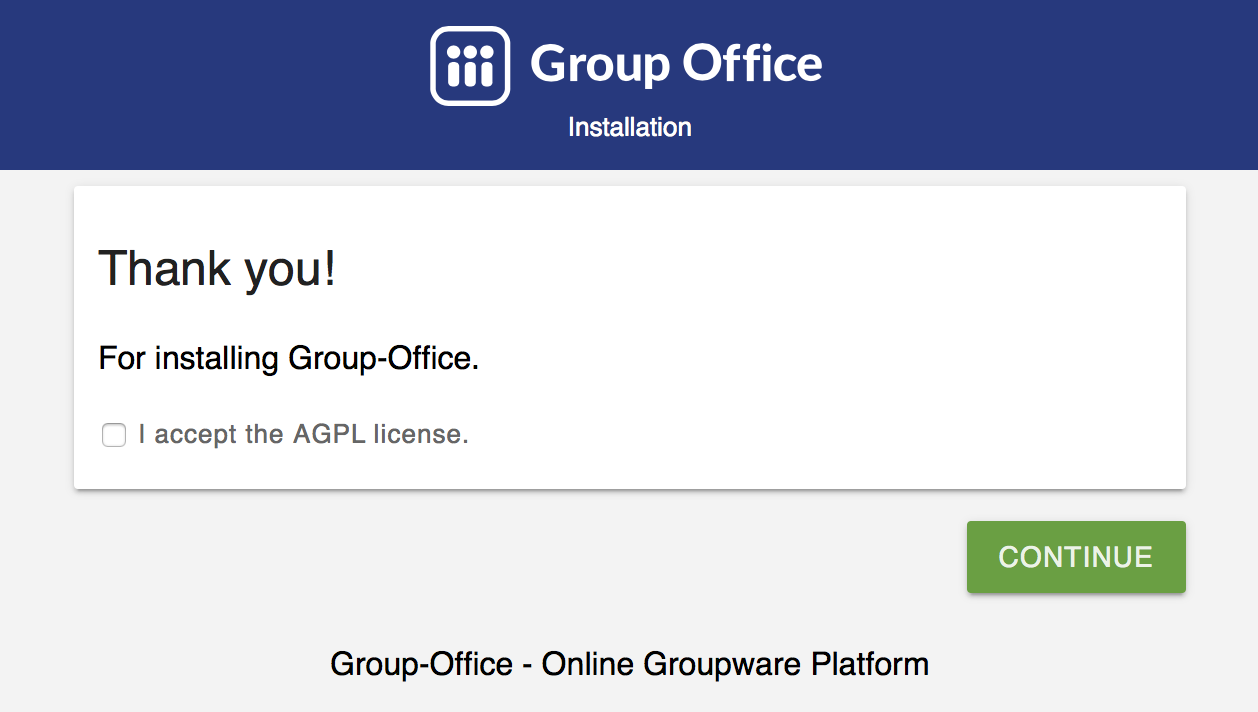Manual from Tarball
We strongly recommend that you use our Debian packages or Docker over this method. But if you really want to use the Tarball source then here is how.
Instructions
Grab the source from:
Put the unpacked source in apache’s document root.
Make sure to make some aliases in the Apache configuration:
Alias /public <YOURDOCUMENTROOT>/public.php Alias /Microsoft-Server-ActiveSync <YOURDOCUMENTROOT>/modules/z-push/index.php #For CalDAV support Alias /caldav <YOURDOCUMENTROOT>/modules/caldav/calendar.php #For CardDAV support Alias /carddav <YOURDOCUMENTROOT>/modules/carddav/addressbook.php #For WebDAV support Alias /webdav <YOURDOCUMENTROOT>/modules/dav/files.php #For WOPI support (Collabora Online and Office Online) Alias /wopi <YOURDOCUMENTROOT>/go/modules/business/wopi/wopi.php #For OnlyOffice support Alias /onlyoffice <YOURDOCUMENTROOT>/go/modules/business/onlyoffice/connector.php #For OpenID service discovery Alias /.well-known/openid-configuration <YOURDOCUMENTROOT>/api/oauth.php/.well-known/openid-configuration #DAV Service discovery. At least required for iOS7 support Redirect 301 /.well-known/carddav /carddav Redirect 301 /.well-known/caldav /caldav
Or if you’re not able to add these aliases you could create a .htaccess file and use mod_rewrite rules. These aliases must work in the root of your domain so don’t put this in a subdirectory. In example groupoffice.example.com/webdav and not www.example.com/groupoffice/webdav:
# Enable rewriting RewriteEngine On # Set the base to slash as it may already have been set to something else in the main configuration. RewriteBase / # The following two lines are only necessary when using PHP in CGI mode and not an apache module RewriteCond %{HTTP:Authorization} ^(.*) RewriteRule .* - [e=HTTP_AUTHORIZATION:%1] # Configure /webdav, /caldav etc. on your domain RewriteRule ^webdav(.*)$ /modules/dav/files.php RewriteRule ^caldav(.*)$ /modules/caldav/calendar.php RewriteRule ^carddav(.*)$ /modules/carddav/addressbook.php RewriteRule ^wopi(.*)$ /go/modules/business/wopi/wopi.php/$1 [L] RewriteRule ^Microsoft-Server-ActiveSync(.*)$ /modules/z-push/index.php RewriteRule ^onlyoffice(.*)$ /go/modules/business/onlyoffice/connector.php/$1 [L] RewriteRule "^/\.well-known/openid-configuration" "/api/oauth.php/.well-known/openid-configuration" [PT]If you purchased Group-Office Professional licenses then make sure the SourceGuardian loader is installed.
Then visit http://yourserver/ and the installer should appear:

The Group-Office installer
Follow the instructions on screen.
Finally, create a cron job for the scheduled tasks. For example in the file /etc/cron.d/groupoffice:
* * * * * www-data php <YOURDOCUMENTROOT>/cron.php
Optionally you can add the config file location:
* * * * * www-data php <YOURDOCUMENTROOT>/cron.php /etc/groupoffice/myoffice/config.php
Authentication with CGI or FastCGI
When using PHP through CGI the “Authorization” header might not be passed by default. You can enable this header by setting the Authorization as environment variable in your VirtualHost section or .htacess file:
SetEnvIf Authorization "(.*)" HTTP_AUTHORIZATION=$1
Alternatively you could use these “mod_rewrite” rules:
RewriteEngine On
RewriteCond %{HTTP:Authorization} ^(.*)
RewriteRule .* - [e=HTTP_AUTHORIZATION:%1]